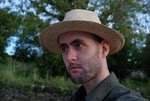
As he sat in the field with all the other revellers, Matt’s little heart was breaking. He kept up the pretence of having fun; he smiled and smoked, drank, danced and sang. But inside he was sodden. A mess of man.
A man, you see, that’s all he was and that’s why he was so forlorn. Just that day, he’d realised that he wasn’t an angel.
Matt hadn’t believed he was an angel all of his life, though there were times as a child when he’d looked to the heavens and felt a kinship with the clouds, while the songs of birds and the music of harp or choir had always caused his heart to skip.
All of this combined at the age of fifteen to first make him question whom exactly he was. All of that, and the fact that he fell from a third storey balcony, three days after his fifteenth birthday and walked away with barely a scratch or bruise. ‘Maybe you’re immortal?’ teased his schoolfriends. ‘Or, maybe I’m an angel?’ – he pondered this thought for too long. It seemed a real possibility, to him. When one comes into real danger, when a life is genuinely threatened, one can react with a freshness of consciousness: with an intimate second to second awareness that the next move could be your last. It can change a person.
Still, Matt was always able to keep this aspect of himself hidden. He didn’t ‘seek’ his divine self. He felt that rather obtuse, and that his radiance would ultimately be ‘revealed’ to him and even to others. Perhaps this would be a slow process, or perhaps he would become transfigured one night in the pub? It was something to consider, anyway.
It has to be said that little else of any heavenly consequence touched Matt’s life until his camping trip to a music festival in the English hill country known as The Lake District. For there, by the vast stretch of Coniston Water, he came back to his mind and found himself strolling with the misty dawn. He had been awake all night, revelling. The stony beach gave him a silent place to settle and relax his body in preparation for sleep. When there, standing over the just lit waters of the lake, he saw a devil watching him. It’s grey lace wings were moth-bitten and haggard, but they flickered like a mosquito’s.
The demon’s thick black tail was coiled around its legs, but it sprang to life, arching and threatening as the fallen angel began to walk with purpose towards Matt. It drew forth clawed hands and unclenched a mouth of fangs. The unnameable wretch wished for battle.
And so Matt fled. Turned from the beast and scrambled up the beach in terror. And as he ran he heard laughing, chiding voices in his head: “You’re no angel! You’re nothing!” These demons howled their derision and Matt ran, sobbing, tripping over roots and guy ropes, collapsing miserably into his broken and sagging tent.
By the evening he’d slept and stopped shaking. He took a beer and smoked a joint. The voices had left him now, but he’d turned away and he could barely face what that meant.
Matt looked around at his close friends, gathered in a loose circle nearby. “I’m just like them now.” That’s all he could think.








